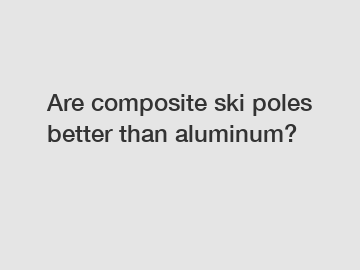Are composite ski poles better than aluminum?
Are composite ski poles better than aluminum?
Composite ski poles have been gaining popularity in recent years as an alternative to the traditional aluminum poles. Lightweight, durable, and often customizable, they offer unique benefits that many skiers find appealing. But are composite ski poles really better than aluminum? Let's delve into this question and explore the various factors that can influence a skier's choice.
Point 1: Weight and Flexibility.

One of the key advantages of composite ski poles is their lightweight nature. Made from carbon fiber or other composite materials, they are significantly lighter than aluminum poles. This reduction in weight can enhance skiers' maneuverability and reduce fatigue during long skiing sessions. Moreover, composite poles tend to have a greater flex compared to their aluminum counterparts. This flexibility allows for smoother pole plants and can help in absorbing shocks while skiing in challenging terrains.
Point 2: Durability and Sturdiness.
When it comes to durability, aluminum poles have long been favored by skiers. They are known for their robustness and ability to withstand harsh conditions, such as impacts with rocks or trees. However, modern composite ski poles have greatly improved in terms of durability. Although they may not be as resistant to severe impacts as aluminum, they are typically strong enough to handle most skiing scenarios. Furthermore, composite poles are less prone to bending or denting, ensuring their longevity over time.
Point 3: Customization and Performance.
Composite ski poles offer a greater level of customization than aluminum poles. Manufacturers can fine-tune the flex, swing weight, and other aspects of the pole to suit different skiing styles and preferences. Skiers can choose from a range of options to find the perfect pole for their needs. This customization can lead to improved performance on the slopes, allowing skiers to optimize their technique and maximize their enjoyment.
Point 4: Cost and Accessibility.
Cost is an essential factor for many skiers when considering their equipment choices. Aluminum poles are generally more affordable than composite ones. This affordability makes them a popular choice for beginners and recreational skiers who may not engage in high-performance skiing. On the other hand, composite poles tend to be more expensive due to the materials used and the manufacturing processes required. However, with advances in production techniques, composite poles have become increasingly accessible to a wider range of skiers.
In conclusion, the decision between composite and aluminum ski poles ultimately depends on an individual skier's preferences and needs. While composite poles offer advantages in terms of weight, flexibility, customization, and performance, aluminum poles still hold their ground as a durable and budget-friendly option. Skiers who prioritize lightweight equipment and desire improved maneuverability may find composite poles to be their preferred choice. On the other hand, those seeking durability and affordability may lean towards aluminum poles. Ultimately, skiers should consider their skill level, terrain preferences, and budget before making a decision. Whether it's composite or aluminum, the most important thing is to find ski poles that best enhance the overall skiing experience.
Want more information on Aluminum Folding Beach Chair, Versatile Camp Bed, LED Triple Head Pivot Base Foldable Crutch? Feel free to contact us.


